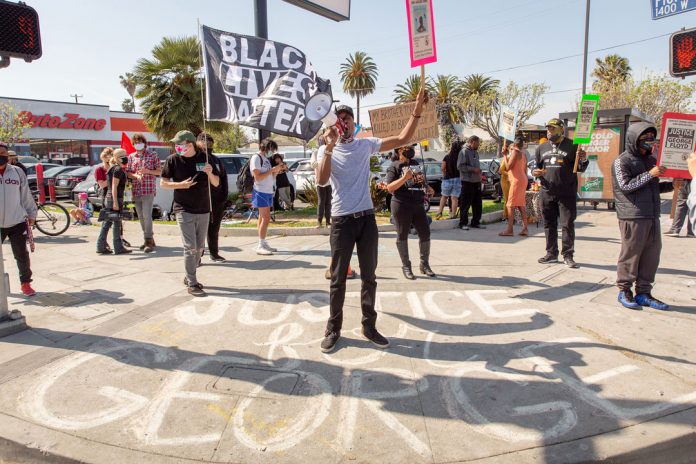
On Tuesday, Derek Chauvin, a former Minneapolis police officer, was convicted of murdering George Floyd, the Black man whose death under Chauvin’s knee led to a nationwide uprising against police brutality last summer.
The news was met with a kind of collective sigh of relief, a moment of catharsis that reverberated across the country. In California, where some of the nation’s most notorious police violence has taken place, it was also a stinging reminder of calls for justice that activists say have gone unanswered.
“This is not justice. Justice would be that we would get our loved ones back,” said Stevante Clark, the brother of Stephon Clark, who was killed by the Sacramento police in 2018. “But this is accountability. And I’ll take that.”
Stephon Clark was gunned down in his grandmother’s backyard when police officers responding to a vandalism call mistook his cellphone for a firearm. The community uproar led to waves of protests. A civil rights lawsuit brought on behalf of Stephon Clark’s children was settled for $2.4 million, but the officers were not charged.
Stevante Clark spoke Tuesday from a city park where he was marking the day by giving away food and clothes to the needy. He wept as the verdict was read.
Cities had been bracing for widespread protests and unrest.
Leaders in Oakland pleaded for peace. And not long after the decision was announced, the familiar thud of police helicopters sounded over Los Angeles, where last summer, Mayor Eric Garcetti angered many by calling in the National Guard to respond to protests. On Tuesday, the city preemptively shut down its coronavirus vaccination sites, anticipating chaos.
As the afternoon dissolved, though, demonstrations felt reverent or even celebratory.
Almost 29 years to the day that the intersection of Florence and Normandie in South Los Angeles erupted in fire and rage over the acquittal of the officers who beat Rodney King, the spot felt as if it was hosting a mini-block party.
“It’s a celebration of the life of George Floyd, it’s a celebration of the verdict and it’s a celebration to understand that the system has finally held accountable people who have been so protected for so long,” said Daymond Johnson, 40, a longtime community activist who is African American and who stood at the corner holding a megaphone.
Activists and officials — including President Joe Biden and Vice President Kamala Harris — also emphasized that the work of remaking U.S. policing is far from over.
“The hard truth is that, if George Floyd looked like me, he’d still be alive today,” Gov. Gavin Newsom said in a statement. “We must continue the work of fighting systemic racism and excessive use of force.”
Laws passed last year by the state Legislature banned the use of a carotid restraint or a choke hold and required state prosecutors to investigate police shootings of unarmed civilians.
Twenty-seven more policing bills are currently under consideration, including one that would require police officer candidates to undergo background checks for membership in a hate group or public expressions of hate.
Brian Marvel, president of the Peace Officers Research Association of California, said that officers who break the law or violate policy must be held accountable in order to build trust within communities.
But the demands spurred by Floyd’s death have gone well beyond reform: Activists have called for defunding or dismantling police departments entirely.
“It’s about more than Derek Chauvin,” Melina Abdullah, a professor of Pan-African studies at Cal State Los Angeles and a founder of the city’s Black Lives Matter chapter, said on Twitter. “It’s about a murderous system.”
Many local leaders in California, particularly in its most progressive corners, have vowed to act on those demands, and their efforts have produced varied results in the past year.
After a monthslong push by parent and student activists, leaders of the Los Angeles Unified School District in February approved a plan to reduce the number of police officers in school hallways.
Berkeley has perhaps gone the furthest of any California city in trying to curtail the number of interactions between residents and the police. Still, the city’s mayor said in February that a sweeping package of reforms shouldn’t be seen as an attempt to “defund the police.”
Oakland went through two rounds of cuts to its police spending. In June, the city diverted $14.3 million from police funds to “community investments,” and in December, a second cut, of $15 million, was to address the city’s budget deficit.
But some of those cuts have been reversed after a spike in murders and attacks on Asian American residents in the city’s Chinatown.
All of that underscores the deep complexity of a racial justice reckoning that historians say hasn’t taken place on this scale since the civil rights movement of the 1960s.
Copyright 2021 The New York Times Company













